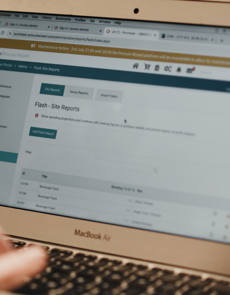What is the best purchase-to-pay software for hospitality?
The global hospitality procure-to-pay solutions market is estimated to reach $2.5 billion by 2030 and is growing at a steady 8.5% annually. With so many providers driving this expansion and offering a variety of features, how do you choose the right one for your business?
At Access Hospitality, we already work with over 20,000 hospitality businesses, helping UK operators streamline their procurement and save time and money, so it’s fair to say that we have quite a bit of knowledge in this area.
In this article, we’ll examine the various features available on the market and help you make a more informed decision.
What is purchase-to-pay software?
For hospitality businesses, operational efficiency is the key to controlling costs and delivering an exceptional guest experience.
Beyond simply being a digital tool for order purchase and invoice payments, a purchase-to-pay (P2P) system plays a central role in:
-
sourcing and purchasing goods and services (food, beverage, consumables, equipment)
-
managing supplier relationships, invoices and payments
-
integrating with inventory, menus and sales forecasting to avoid over-/under-ordering and optimise cost.
What are the types of purchase-to-pay software?
When considering implementing purchase-to-pay software, it’s key to evaluate the pros and cons outlined in the context of your organisation's specific needs and capabilities, to ensure you choose the right one.
Here are the main types you’ll come across:
Cloud-based solutions
-
Hosted externally and accessed via web or mobile.
-
Allow scalability (up or down) depending on demand.
-
Back-ups, updates and data management are provider-handled.
-
Consider data security, customisation flexibility and vendor lock-in options before choosing a provider.
-
Invest in a software solution that is committed to protecting data and keeping tight control of costs.
On-premises solutions
-
Installed locally on your own hardware and infrastructure.
-
Offers the peace of mind of knowing your data is located within your in-house servers
-
Drawbacks: higher cost, maintenance burden, less agility for hospitality’s fluctuating needs.
-
Small businesses with more limited resources would not necessarily benefit from these types of solutions, due to the significant investment required to develop in-house software. In these instances, seeking out a reliable third-party provider can be beneficial.
Standalone procurement software
-
Dedicated just to the procurement process: orders, invoices, supplier management.
-
Often more advanced in that niche, but may lack deep integrations (inventory, POS, menus).
-
Ensuring seamless data flow between these systems can be complex and may require additional time and resources for integration and maintenance.
Integrated suites
-
Combine procurement, inventory, invoicing, analytics, sometimes workforce or menu management in one platform.
-
Having all your data housed in one system creates multiple benefits, including data consistency and accuracy, and improved security.
-
Despite its ability to successfully streamline operations, integrated suites can be complex to implement and have a higher upfront cost.
-
Less customisable in comparison to in-house solutions, but if you are looking for a more data-driven solution to streamline operations, you may not consider this as much of an issue.
Industry-specific
-
These systems offer features and functionalities designed to address industry-specific procurement processes, regulations, and standards.
What are the key features of P2P software for hospitality?
When you’re weighing varying options of software, it’s important to identify the inefficiencies currently present across operations, so you can choose the software solution that is most likely to benefit the business overall.
-
Cash flow forecasting & real-time reporting
– View spend, ordering, deliveries, stock and payments in real-time.
– Helps spot patterns, forecast demand and reduce unnecessary cost.
-
Finance & accounts automation
– Invoice tracking, purchase-ledger automation, payment approvals, supplier credit reclamation.
– Especially valuable in multi-site operations with complex spend.
-
Orders, deliveries & invoicing flow
– One system to create requisitions → purchase orders → goods receipt → invoice match → payment.
– Reduces errors, manual admins and mismatches.
-
User-friendly interface
– Staff (kitchen, bar, procurement) should be able to use the system with minimal training.
– Good dashboards, mobile access for back-of-house operations.
-
Seamless integration
– Link to POS, accounting system, inventory management, and menu engineering.
– Data flows matter: supplier orders, stock levels, menu performance.
-
Supplier management
– Centralised supplier database, price comparisons, performance monitoring, contracts, delivery terms.
– Enables negotiation, switching suppliers, better cost control.
-
Mobile accessibility
– Especially for venues where staff are on the move, in kitchens/pubs/outlets.
– Enables ordering, approvals, stock checks from tablets/phones.
-
Customisation & scalability
– The system should match your current operation but be able to scale as you grow (new sites, new categories, more suppliers).
-
Security & support
– Robust user roles, audit trails, data protection, regulatory compliance (particularly relevant in UK hospitality).
– Good vendor support (training, onboarding, upgrades). - AI‑powered insight & recommendations
– Intelligent alerts for GP dips, supplier price spikes, waste patterns and budget risks, plus queries on spend and menus through assistants like Copilot.
Which is the best purchase-to-pay system for hospitality operators?
Each solution has its unique selling points, strengths and weaknesses. Which one you choose will depend on your needs.
Access Procure Wizard Evo
Overview: Hospitality‑specific P2P platform covering ordering, supplier management, invoice matching, budget tracking, and integrated stock/menu costing. Procure Wizard Evo is the proven, market‑leading solution trusted by thousands of sites, now with AI‑powered insights, mobile‑first design and global, multi‑currency capabilities.
Pros:
-
End‑to‑end P2P with strong supplier catalogue control
-
Deep hospitality features (recipes, menu costing, waste tracking)
-
Robust reporting and approval workflows for multi‑site governance
-
AI‑driven analytics and Copilot for instant visibility of GP, spend and supplier performance.
-
Mobile‑first inventory and approvals via Stock & Inventory and the Access Evo app, ideal for teams who work on the kitchen floor or across multiple venues.
Cons:
-
Implementation and setup can take time for complex estates
-
Smaller venues may not need every advanced module
Results seen by operators:
-
Automation of ~95% of invoice processing
-
Recovery of missed credits worth ~£180k+ per year
-
~5,000 working hours saved where teams processed ~150k invoices annually
Fourth Hospitality
Overview: Broad operational suite spanning workforce management, inventory, and procurement, designed for large or complex hospitality groups.
Pros:
-
Unified platform across labour, inventory, and purchasing
-
Good fit for centralised, multi-brand operations
-
Mature enterprise feature set
Cons:
-
Heavier implementation/change management
-
May exceed needs (and budget) of smaller single-site operators
Click to see how Access Procure Wizard stacks up versus Forth in this comparison table.
Apicbase
Overview: Back-of-house control with emphasis on recipe management, menu engineering, and inventory; includes purchasing and forecasting.
Pros:
-
Good recipe/ingredient control and costing detail
-
Strong multi-unit standardisation and analytics
-
Useful compliance support (e.g., allergens/traceability)
Cons:
-
Procurement depth may trail dedicated P2P specialists
-
Integration scope can add setup complexity
Marketman
Overview: Cloud inventory and purchasing with POS/accounting integrations, geared to independents and mid-size venues.
Pros:
-
Quick to deploy; intuitive mobile and web workflows
-
Solid vendor/invoice management and recipe costing
-
Good fit for smaller teams needing control without heavy lift
Cons:
-
Lighter on enterprise-grade procurement automation
-
May lack some advanced multi-site controls
Purchase Warrior
Overview: Newer, hospitality-focused procurement platform with a mobile-first, AI-assisted approach across P2P and stock/waste tracking.
Pros:
-
Fast, modern UX with guided ordering and alerts
-
Real-time insight across spend, waste, and budget control
-
Designed for agile multi-site operations
Cons:
-
Newer entrant: integrations/case studies still expanding
-
May require validation for legacy/complex stacks
Ready to optimise your procurement process?
In this article, we’ve looked at what makes the best purchase-to-pay system and the key features that help manage the daily operations of your business.
Each solution has its strengths and weaknesses, and the best choice for you depends on the specific needs, size and budget of the hospitality business.
Access Procure Wizard Evo is a reliable and powerful hospitality procurement software, helping operators simplify purchasing, recover lost credits, and gain full visibility over spend. With Procure Wizard Evo, you can also layer in AI‑driven insights, global ordering and modern mobile workflows to keep teams in control wherever they are.
By automating up to 95% of invoice processing and reducing manual admin, it frees teams to focus on guests while protecting margins and improving control across every site.
To see what next‑generation, AI‑powered purchase‑to‑pay looks like in practice, watch the short demo video or download brochure.

 AU & NZ
AU & NZ
 SG
SG
 MY
MY
 US
US
 IE
IE






